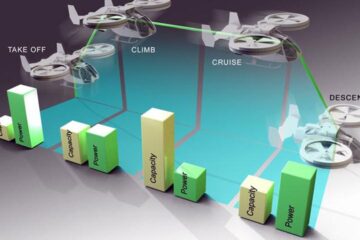IMS developing Japan’s first “Cold (neutral) atom” quantum computers

Illustration of the cold-atom (neutral-atom) quantum computer in operation at Kenji Ohmori group. (Graphic by Takafumi Tomita)
Credit: Takafumi Tomita (Kenji Ohmori group)
New collaboration with 10 industry partners toward commercialization.
Institute for Molecular Science (hereinafter “the IMS”), National Institutes of Natural Sciences, has established a “Commercialization Preparatory Platform (PF)” to accelerate the development of novel quantum computers, based on the achievement of a research group led by Prof. Kenji Ohmori. The launch of the PF was made possible by collaboration with 10 industry partners, including companies and financial institutions.
The 10 partners that joined the PF include (listed alphabetically): blueqat Inc., Development Bank of Japan Inc., Fujitsu Limited, Groovenauts, Inc., Hamamatsu Photonics K.K., Hitachi, Ltd., and NEC Corporation.
With the PF in place, the IMS will leverage the expertise of the participating companies and seek for advice and support on matters related to commercialization, such as the processes of establishing a start-up company, developing domestically produced quantum computers, and R&D efforts to enable practical application of quantum computers and their associated services. It plans to launch a start-up company by the end of its FY2024 and begin the development of “cold (neutral) atom” quantum computers.
Background
Fierce competition is underway globally for the development of quantum computers by various modalities. However, there remain a number of issues that need to be addressed in order to ensure that these computers can be used practically; these issues include the need to expand the scale of these computers and the ability to take measures against errors that may occur during computation. In recent years, the “cold (neutral) atom” modality, which uses individual atoms as qubits, has been attracting attention from industry, academia, and governments around the world as a revolutionary new method to overcome these issues. Another feature of the cold (neutral) atom modality is that it operates at room temperature and does not require any refrigerators, which are necessary for the superconducting qubit and silicon qubit modalities.
The Ohmori group at the IMS is leading the world in developing the cold (neutral) atom quantum computers. The group has a number of technological advantages and core competencies (*1), including “optical tweezers” and microscope technologies to control a large number of high-quality qubits on a flat surface, and “ultrafast two-qubit gates” that use an ultrafast laser to create a quantum entanglement between two qubits in just 6.5 nanoseconds. In particular, the two-qubit gates represent an important core technology that enables the extraordinary computational speed of quantum computers. In 2022, the ultrafast two-qubit gates developed by the Ohmori group achieved a disruptive innovation that accelerates the two-qubit gates of the conventional cold (neutral) atom method by two orders of magnitude at once.
By taking advantage of these technical advances and core competencies of the Ohmori group, the IMS will accelerate the development and commercialization of quantum computers in collaboration with its industry partners.
World’s first demonstration of quantum supremacy using superconducting quantum computers in 2019 (*2)
Message from Professor John Martinis, University of California, Santa Barbara:
“Professor Kenji Ohmori and his team have recently made a major breakthrough to overcome the weakness of the neutral atom method by using ultrafast lasers to drastically accelerate its two-qubit gate by two orders of magnitude. Their optical tweezers and microscope technology for manipulating individual atomic qubits is also outstanding. The team is therefore an extremely promising candidate for the realization of a practical quantum computer in the near future. I would like to actively participate in and contribute to the practical application and commercialization of their quantum computer by making use of my experience.”
Message from Yuki Takemori, General Manager, Innovation Promotion Office, Business Planning & Coordination Department, Development Bank of Japan Inc.
Project General Manager of PF:
“After the bursting of the bubble economy, the Japanese economy spent the ‘lost 30 years’ without a clue to its further growth. I expect that quantum computing will be a technology that will bring revolutionary evolution to mankind, similar to the Internet and artificial intelligence (AI). It will grow into an extremely important industry for Japan, acting as a catalyst for its development and advancement. The technological capabilities of Professor Kenji Ohmori and his team are a global treasure and a trump card for the revival of the Japanese economy. I expect that this project will spread its wings far and wide.”
Message from Professor Kenji Ohmori, Institute for Molecular Science:
“I would like to express my sincere gratitude for the support of such distinguished companies for the development of our cold-atom (neutral-atom) quantum computer. Although we have absolute confidence in our basic technology, the development of practical quantum computers requires the integration of a variety of ‘enabling technologies’ including conventional electronics, software, system engineering, and architecture. With the launch of this commercialization platform, we will further strengthen our development efforts and work hard to create a quantum computer that can contribute to our society as soon as possible.”
Notes:
(*1) Core competency: a defining capability that distinguishes an enterprise from its competitors
(*2) Quantum supremacy: a demonstration of a quantum computer’s advantage over classical computers, including supercomputers, to process calculations that would conventionally take a long time to process at unmatched speeds
Research Funding
Cabinet Office / JST Moonshot R&D Program (JPMJMS2269)
MEXT Quantum Leap Flagship Program (JPMXS0120181201)
Related Links
• Kenji Ohmori group:
https://ohmori.ims.ac.jp/en/
• Ohmori quantum computer project at the Moonshot Research and Development Program by the Cabinet Office of Japan:
https://www.jst.go.jp/moonshot/en/program/goal6/69_ohmori.html
https://ms-ohmoripm.ims.ac.jp/en/
• Quantum Leap Flagship Program (MEXT Q-LEAP):
https://www.jst.go.jp/stpp/q-leap/en/index.html
Source: Institute for Molecular Science, National Institutes of Natural Sciences
Contact:
Kenji Ohmori (ohmori@ims.ac.jp), Kento Igami (igami@ims.ac.jp)
Institute for Molecular Science, National Institutes of Natural Sciences
Tel: +81-564-55-7459
All latest news from the category: Information Technology
Here you can find a summary of innovations in the fields of information and data processing and up-to-date developments on IT equipment and hardware.
This area covers topics such as IT services, IT architectures, IT management and telecommunications.
Newest articles

Ultrablack coating could make next-gen telescopes even better
Thin film coating can be applied to magnesium alloys for aerospace and optics applications. Sometimes, seeing clearly requires complete black. For astronomy and precision optics, coating devices in black paint…

More than flying cars
eVTOL battery analysis reveals unique operating demands. Researchers at the Department of Energy’s Oak Ridge National Laboratory are taking cleaner transportation to the skies by creating and evaluating new batteries…

A sprayable gel could make minimally invasive surgeries simpler and safer
Applied during endoscopic procedures, GastroShield could help prevent complications such as bleeding and leakage from weakened gastrointestinal tissues. More than 20 million Americans undergo colonoscopy screenings every year, and in…





















